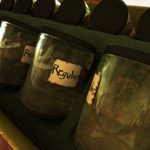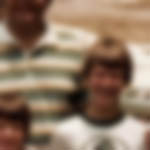 The neighborhood where I grew up lay on the border between the old quarter and the new. The natives to the land were descendants of those left behind in the frontier days, themselves too unfit physically, socially, or mentally to make the trip westward. The late twentieth century had seen the rise of suburban sprawl and expensive homes, and with that came the lawyers and politicians willing to pay any price to live outside the nearest city. The divide between the old and new was a constant source of fascination for me, especially as tensions flared. On weekends I could hear them both from my bedroom window. To my left the bucolic rhythms of jaunty jug bands and the synchronized slap of bare feet on floorboards echoed into the night, and the morning brought fire and brimstone sermons and wails of repentance. To my right the antiseptic strains of classical music accompanied barbecue gatherings that spiced the air until dusk, and the morning brought the chatter of televisions to keep families safe from conversation and lawsuits.
The neighborhood where I grew up lay on the border between the old quarter and the new. The natives to the land were descendants of those left behind in the frontier days, themselves too unfit physically, socially, or mentally to make the trip westward. The late twentieth century had seen the rise of suburban sprawl and expensive homes, and with that came the lawyers and politicians willing to pay any price to live outside the nearest city. The divide between the old and new was a constant source of fascination for me, especially as tensions flared. On weekends I could hear them both from my bedroom window. To my left the bucolic rhythms of jaunty jug bands and the synchronized slap of bare feet on floorboards echoed into the night, and the morning brought fire and brimstone sermons and wails of repentance. To my right the antiseptic strains of classical music accompanied barbecue gatherings that spiced the air until dusk, and the morning brought the chatter of televisions to keep families safe from conversation and lawsuits.
Daily I watched the uneasy interplay of two cultures brought together in a time of transition, like tectonic plates, one steadily subsuming the other. And though it was this dynamic that was the source of many of my childhood amusements, there’s one memory in particular that I still hold most dear.
The redneck kids decided that the measure of one’s coolness was a factor of how fast they could drive their pick-ups over the neighborhood speed bumps. These latter, like the pavement itself, were an innovation of the “fancy folk,” and a novelty to a people raised on packed dirt and warped porch wood. Of course coolness, like any drug, is something that must escalate in order to remain potent. I was witness to this very phenomenon as, over the course of just a few years, the rednecks went from barely slowing down to actually accelerating as they approached the speed bumps.
Now, it so happened that one of the most unforgiving speed bumps was right in front of my family’s house, which was good fortune for a curious child such as I. So steep was the mound that I would come home from school each day to find my yard littered with the detritus launched from the rear of the rednecks’ pick up trucks as the tires bounced over the incline. Jews harps, corn cob pipes, spent rifle shells, bandanas smelling of gasoline and sweat, old photographs of proud grandmothers grown solemn after their husbands fell for the Confederacy, and a myriad of carved containers.
I was like an archaeologist, poring over the exotic relics from some foreign, but not so distant arcadian land. I’d started a collection, exhibited in our otherwise unused guest house, and my friends and I took to calling it The Museum of White Trasheology. We would take refuge there from the unforgiving heat of late summer, and invent stories to explain the paraphernalia, and we would practice our hillbilly accents while pretending that our lemonade was really moonshine from a still.
A week before school was set to start, our play became more frenzied and our laughs more shrill, but as the last few days of freedom dwindled we could no more deny our lethargy than a death row inmate making his final walk. As summer grew moribund the world we’d created for ourselves had grown more fragile. But I remember the renewed sense of hope I felt on the day I found the long cardboard carton lying intact on my lawn. Rather than opening it where I stood, I instinctively checked to make sure no one was watching before taking it to The Museum.
I called my friends over, and before long we were assembled around the item like curators around the latest artifact from the field. This moment, staring down at the carton, seemed like nothing more than an idyllic memory even then, and I hesitated, not wanting to spoil it. I remember the steady drone of locusts outside, and how it swelled periodically like violins in a horror movie soundtrack. And when I looked up my friends were all looking back at me. Of course they had been waiting for me.
I fished out my pocket knife and slit the wide tape around the seam, then pried the lid off with my fingernails. Inside were two rows of sealed glass cylinders, each with a single shrunken head inside. All but five of the heads were suspended in clear plasma, and the curve of the cylinders magnified the knotty brown skin, empty puckered eye sockets, and mouth slits sewn shut with coarse black thread. Thoughts of school faded like an old dream as our minds filled with superlatives. In an instant our lives had become larger than summertime – we’d made a genuine discovery.
Leaning in to get a closer look, I turned one of the cylinders in its hollow to get a better look at the label. The hand was crude, but the single word was legible: “Regular.” They were all regular, all save for the last two which were dry as raisins. I turned the jar at the end, and jerked my hand away when the words were revealed: “no sauce.”
“Guys,” one of my friends said, “isn’t Jeb’s that rickety old restaurant up by the creek?” He was pointing to a sticker on the outside of the carton. “I don’t know about that,” said another, peering down at one of the cylinders, “but this head looks just like Lawrence’s father, the divorce attorney? Look, he has that huge bulbous nose, just like Mr. Burtenshaw had.” Mr. Burtenshaw, rumor had it, skipped out on his family a few weeks back. They were still talking about it on the news, because the man had neither packed nor left a note. So there was no doubt in our minds that we were looking at Mr. Burtenshaw now – all that remained of him. “Hey, Lawrence,” I said holding a mock phone to my ear, “we found your dad.” There was a stunned silence, and then we all laughed ourselves hoarse.
By the time school started my life felt like an empty routine. I felt vulnerable because of what I knew, because I had gotten a peek behind the curtain. I had to wonder if our parents – the adults – were complicit in this. Was that the deal they’d made? The so-called “fancy folk” could build their townhome estates and strip malls on redneck land provided the flock was trimmed back from time to time? We watched the sons of lawyers and politicians mingle with the redneck kids, but with a newfound respect. And maybe they sensed something about my friends and me. We were quieter when they were around, and sometimes I’d see one of them touch the brim of their baseball cap and nod in our direction. “They know,” said my buddy. “You know they know we know.”
There was a natural order to things, after all, and it had simply adapted to the times. Adapted to the point where shrunken lawyer heads became a part of the balance, as well as a delicacy.
Of course things are different now.
 “Hello there.” My stepfather would say hello to us whenever he entered the room, invariably. I quickly learned–by rote–that a response was expected. It didn’t seem so outrageous, of course. In fact it seemed a friendly enough thing to do, so I tried it myself for a while. “Hello, Mom. People? Hello. Hello, all.” It didn’t take though.
“Hello there.” My stepfather would say hello to us whenever he entered the room, invariably. I quickly learned–by rote–that a response was expected. It didn’t seem so outrageous, of course. In fact it seemed a friendly enough thing to do, so I tried it myself for a while. “Hello, Mom. People? Hello. Hello, all.” It didn’t take though. I noticed the car only because of the fancy sign propped up just behind its windshield, which was fogged like a cataract. The sign, intricately decorated with macaroni and glass beads, read, “Finally For Sale, $4,000,” like people had been waiting for it all this time. The sign was far more eye-catching than the subject of advertisement, itself a nondescript American make whose paint was of some elusive color between beige and gray. The U.S. does still craft nondescript cars, though the heyday of these little charmers was in the mid-seventies. Many of them didn’t live long enough to see the beginning of the eighties. These were cars made without flourish, lacking entirely any kind of stylistic nicety. And a $4,000 asking price was far too much to hope for.
I noticed the car only because of the fancy sign propped up just behind its windshield, which was fogged like a cataract. The sign, intricately decorated with macaroni and glass beads, read, “Finally For Sale, $4,000,” like people had been waiting for it all this time. The sign was far more eye-catching than the subject of advertisement, itself a nondescript American make whose paint was of some elusive color between beige and gray. The U.S. does still craft nondescript cars, though the heyday of these little charmers was in the mid-seventies. Many of them didn’t live long enough to see the beginning of the eighties. These were cars made without flourish, lacking entirely any kind of stylistic nicety. And a $4,000 asking price was far too much to hope for. The neighborhood where I grew up lay on the border between the old quarter and the new. The natives to the land were descendants of those left behind in the frontier days, themselves too unfit physically, socially, or mentally to make the trip westward. The late twentieth century had seen the rise of suburban sprawl and expensive homes, and with that came the lawyers and politicians willing to pay any price to live outside the nearest city. The divide between the old and new was a constant source of fascination for me, especially as tensions flared. On weekends I could hear them both from my bedroom window. To my left the bucolic rhythms of jaunty jug bands and the synchronized slap of bare feet on floorboards echoed into the night, and the morning brought fire and brimstone sermons and wails of repentance. To my right the antiseptic strains of classical music accompanied barbecue gatherings that spiced the air until dusk, and the morning brought the chatter of televisions to keep families safe from conversation and lawsuits.
The neighborhood where I grew up lay on the border between the old quarter and the new. The natives to the land were descendants of those left behind in the frontier days, themselves too unfit physically, socially, or mentally to make the trip westward. The late twentieth century had seen the rise of suburban sprawl and expensive homes, and with that came the lawyers and politicians willing to pay any price to live outside the nearest city. The divide between the old and new was a constant source of fascination for me, especially as tensions flared. On weekends I could hear them both from my bedroom window. To my left the bucolic rhythms of jaunty jug bands and the synchronized slap of bare feet on floorboards echoed into the night, and the morning brought fire and brimstone sermons and wails of repentance. To my right the antiseptic strains of classical music accompanied barbecue gatherings that spiced the air until dusk, and the morning brought the chatter of televisions to keep families safe from conversation and lawsuits.